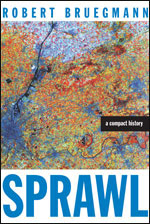Review: Bruegmann, Sprawl
 The London Review of Books recently praised Robert Bruegmann’s Sprawl: A Compact History. From the review by Andrew Saint: "To judge whether sprawl is a symptom of global capitalism at its most rampant and wasteful … technical arguments must be addressed. Bruegmann takes us through them lucidly and economically, neither flinching from nor getting mired in detail, and steering deftly between neo-con smugness and liberal anguish. These qualities make Sprawl a textbook for our times."
The London Review of Books recently praised Robert Bruegmann’s Sprawl: A Compact History. From the review by Andrew Saint: "To judge whether sprawl is a symptom of global capitalism at its most rampant and wasteful … technical arguments must be addressed. Bruegmann takes us through them lucidly and economically, neither flinching from nor getting mired in detail, and steering deftly between neo-con smugness and liberal anguish. These qualities make Sprawl a textbook for our times."
In his incisive history of the expanded city, Bruegmann overturns every assumption we have about sprawl. Taking a long view of urban development, he demonstrates that sprawl is neither recent nor particularly American but as old as cities themselves, just as characteristic of ancient Rome and eighteenth-century Paris as it is of Atlanta or Los Angeles. Nor is sprawl the disaster claimed by many contemporary observers. Although sprawl, like any settlement pattern, has undoubtedly produced problems that must be addressed, it has also provided millions of people with the kinds of mobility, privacy, and choice that were once the exclusive prerogatives of the rich and powerful.
Read an excerpt.